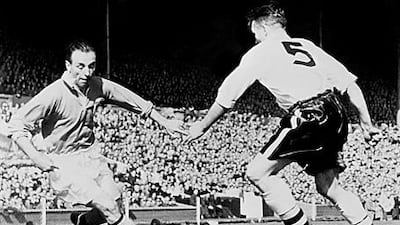Five years short of the centenary of his birth, the legend of Stan Matthews still takes a bit of believing; how a poorly-educated kid from the back streets of Hanley, in Stoke, became England's most cherished sporting figure and the symbol of his game the world over. A footballer beloved by more people - from his own dear folk in the Potteries to the children in the black township of Soweto, in South Africa, whom he visited every summer for almost 40 years - than any of the great heroes, Pele included, who came before or after. A footballer elevated by the masses into something resembling a god.
The object of this devotion always regarded descriptions such as an icon as blasphemy. "I'm just an ordinary man," Matthews, who was born on February 1, 1915, would insist. "I certainly don't regard myself as anything special." Just an ordinary man who played English First Division football until the age of 50 and won 54 England caps; an ordinary man who gained sporting immortality at Wembley in the Matthews Final of 1953 and world renown as the Wizard of the Dribble; an ordinary man who, despite his pride at the honour, blushed whenever protocol demanded he be presented as Sir Stanley.
An ordinary man, then, but one who did extraordinary things. "I don't know if I was all that good. I never saw myself play, so how do I know?" he was quoted as saying. As he admitted, he never won a tackle, seldom scored (35 goals in 664 games for Stoke and Blackpool), was feeble in the air and often drove teammates to distraction by refusing to pass the ball. Though Pele was among his greatest admirers - "even in Brazil, the name Matthews carries the sound of magic" - Sir Stan would squirm at the suggestion he accomplished anything remotely heroic.
"I'm no hero. Doctors and nurses are heroes. Surgeons. People like that. We had a real hero born in my home town of in Stoke-on-Trent. Reginald Mitchell, who designed the Spitfire. He saved Britain, now that's what I call a hero," he said. Knowing the third of his four sons was blessed with greatness even before his debut for Stoke reserves aged 15, Jack Matthews, men's hairdresser and sometime boxer known as "The Fighting Barber", insisted the young Stanley adhere to a code of Spartan discipline.
A daily regime which began at 6am with breathing exercises by an open window (a routine from the 1920s he repeated until a few months short of his death in 2000), followed by a brisk walk to Stoke's Victoria Ground where he had to clean 46 pairs of boots and sweep the dressing room after training. Then he had to walk home; eight miles a day on foot unless it snowed when his father would give him his bus fare ("I used to pray for snow," Matthews said). By night he honed his skills in the street, dribbling an inflated pig's bladder under a gas lamp. By 17, the winger was held in awe throughout the land, except in his own home where sibling tales of their brother's remarkable deeds on the touchline were greeted with stern discountenance.
"I don't know what it was about my father. He never watched me play. And when I came home after a match, he never asked how we got on, or if I did well. It was only years later my older brother told me my father used to sneak away from the barber's shop on Saturday afternoons to see me. But he never said anything. Even when I was playing for England, he never praised me. Even now I wonder why he never said anything."
But Matthews himself made a point of never discussing, the '53 FA Cup final except to say: "Poor Stan Mortensen scored a hat-trick (in Blackpool's 4-3 defeat of Bolton) and yet they always refer to it as the Matthews Final." By general agreement, Matthews' greatest performance was at Wembley in '55, when he made all seven goals in England's rout of Scotland. For weeks the Scots' left-back Harry Haddock had studied his opponent's every move. "The first time Matthews got the ball and came towards me I knew exactly what he was going to do. He shuffled up with the ball on his right toe and fainted left, so I swayed right. Then, exactly according to plan, he darted to his right. I thought I had him but I was wrong. He was gone, fast as lightning. He must have done the same thing to me a hundred times that afternoon."
Sir Stan's abiding regret was he retired too soon. "I could have gone on another two years but I thought 50 was a good age to get out. Biggest mistake I ever made." sports@thenational.ae

